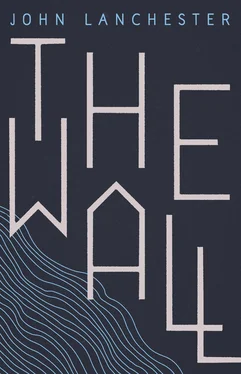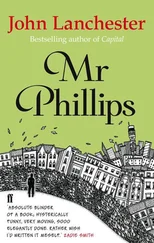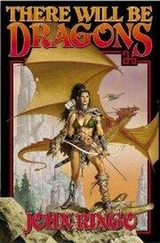‘You’re wounded,’ he said. He stepped back and spoke into his communicator and it seemed mere seconds later that a military ambulance came alongside the inner ring road and two corpsmen jogged up the Wall. It wasn’t until this point that, like a switch being toggled, I was abruptly in pain. It started in my right shoulder and spread all down my right side. It was an anthology of pain types compressed together, at the same time dull and sharp and stabbing and throbbing and gripping.
‘Take good care of this one, he did well tonight,’ the Captain said to the medics. I didn’t know at the time, but that was to be the only compliment he ever paid me. They put me on the stretcher and carried me down to the ambulance and hooked me up to various tubes, and the pain began to subside.
Time now began running at a completely different speed. During the fight each split second gave you time to think, to see what was coming, to consider alternatives and consequences in the moment between pulling a trigger and the bullet coming out of the barrel. Then there was a short passage of time when I was in the moment, during the moment, time passing at the right speed, which was roughly now, as I got into the ambulance. After that, the next few days went past in a blur of tubes and pills and tests and proddings and doctors, interrupted by passages when senior members of the Border Defence Force (too important to be mere Defenders) came and gravely, respectfully asked repetitive questions about what had happened that night.
While they asked questions, they also answered mine, or some of them. That’s how I found out what happened. We had been attacked by twelve Others, who went after posts 8, 10 and 12, Cooper and Shoona and me. They had used inflatables to get within a few hundred metres of the Wall and had then swum the last bit. They used suction devices to attach to the Wall initially, then the same kit climbers use on rock faces. The fact that it was a noisy, windy night had been crucial: they had probably been waiting for that. They were trained and competent. They were from sub-Saharan Africa. It was quite likely that they had been professional soldiers in their previous lives. They had used crossbows as their first weapon, for the silence. Then they switched to guns. The guns had been taped and sealed to keep out the water. The plan had been to get as many of us as possible before they started making noise. A good plan. It was a crossbow bolt that had killed Mary and another one that had hit me. Shoona too had been wounded by a crossbow and then killed in the subsequent firefight. Cooper had been shot and was badly wounded and might not survive. Two other Defenders had died. All of the Others had been killed. So none of us would be put to sea.
On the third morning, when I was still out of it, the Captain came around to visit, accompanied by the baby politician who had given the talk at training camp, and by a senior non-baby politician whose name I did not catch. ‘Well done,’ they said, with variations. They gave me a piece of paper which apparently was a form of official commendation. Not that it meant anything: the only prize worth having would have been remission from more time on the Wall, and that wasn’t on offer. It was a pretty short visit and I was feeling woozy all the way through.
I woke up on the fourth morning with a clear head. Another toggled switch: pain subsided, brain fog gone. Hifa was sitting at the end of my bed, fiddling with her communicator. She was wearing a dressing gown. On the table beside her I could see that she had brought a box of chocolates, which she had opened and was now eating.
‘I’m guessing those were supposed to be for me,’ I said.
‘Oh hi,’ she said, looking up and blushing slightly. ‘No, they were for me actually. I’ve been in here too. Small wound but they kept me in for observation. Concussion. They’re letting me out today.’
‘You broke the rules on use of the grenade launcher.’
‘I did, didn’t I?’
She took another chocolate.
‘It’s surprisingly nice in here,’ Hifa said. I hadn’t noticed this, but looking around, I could see that it was true. The bed and chairs were much better made than anything we got as standard on the Wall; there was a view of distant hills. Even having a single room was a luxury. The room had a bath and toilet. There was Help. You were brought three meals a day. You had your own television. It was certainly a pleasanter place to be than the barracks. ‘Almost worth it,’ Hifa added.
‘For concussion maybe, but some of us got shot.’
‘Well, by a crossbow – not sure that counts as being shot.’
‘Tell Mary that,’ I said, and realised as soon as the words were out of my mouth that it was the wrong thing to say, horribly wrong, not fair to Hifa and not fair to Mary, and if I thought about it for long enough, not fair to myself. Hifa’s face changed and I could see her feelings churning, the fear and loss and grief, and by seeing them in her I could suddenly locate them in myself too. Mary was dead, had died in her own blood standing three feet away from me, and Shoona had died too, in terror and in pain, and maybe Cooper was going too, to join all the others who died that night, and me so nearly among them, death so near in those moments I could stretch out and touch the hem of its coat. I hadn’t been having any feelings about what had happened – I suppose I just hadn’t been ready to. Now I felt terrified, of the night itself – frightened of what I had already been through, which makes no sense, but that is what I felt – and with it had a sick sense of apprehension of going back to the Wall and living through it all again.
‘Sorry,’ I said, but although she had tears in her eyes, she just shook her head, apology not needed, she understood. It can happen, when you spend all your time with a group of people, that interaction between you gets stuck; there’s a particular register in which all your exchanges happen. With Defenders, there was stand-your-ground joshing, banter which could be aggressive and could be defensive but was never not there: a wall of its own. There were hardly any times when you were just plainly and defencelessly yourself with other people. That could make certain sorts of conversation difficult to have. Hughes talking about what he wanted to do after the Wall – that was an unusual thing. Now, in this moment with Hifa, I felt a physical barrier between me and whatever was supposed to happen next. I didn’t know what to say other than that I had no idea what to say. I hadn’t meant to hurt her feelings. I hadn’t meant to hurt my own feelings, for that matter. I didn’t want to make a joke about Mary, whose death had been the worst thing I had ever seen, the worst thing I ever hoped to see. Hifa had been trying to banter with me, I had been trying to do the same back, and we had both messed it up. I could see that she thought, felt, the same; see too that neither of us knew what to say next. We sat for a little while, alternating looking at each other and looking at the floor, both feeling pretty miserable.
‘I’m sick of the Wall,’ Hifa eventually said.
‘Me too.’
‘If we stay on the Wall, and the attacks keep happening, and the attacks are like that, we’ll eventually die.’
‘Maybe.’
And then she said something which I have to admit I didn’t expect:
‘Do you want to Breed with me?’
You may know in general that the nation needs more babies, and you may know that it encourages people to Breed, but you don’t know the half of it until you actually set up in business as a Breeder yourself. Breeders, or people trying to Breed, get special quarters on the Wall. They get rooms to share. In addition to the room and the extra rations you also get some say in where you want to serve your time on the Wall, and the ability to change shifts. In other words you can move away from the place and the squad you were previously with – as far as I know, becoming a Breeder is the only way you get to have any say in that. A pretty sweet deal. If you could get used to the thought of bringing another person into the broken world. I can honestly say that the idea had never crossed my mind, before Hifa suggested it, and then as soon as she had, I knew I had no choice. It was the closeness of death – that was what did it. We could save ourselves from dying by bringing somebody new into the world. It suddenly seemed like the only thing to do.
Читать дальше












